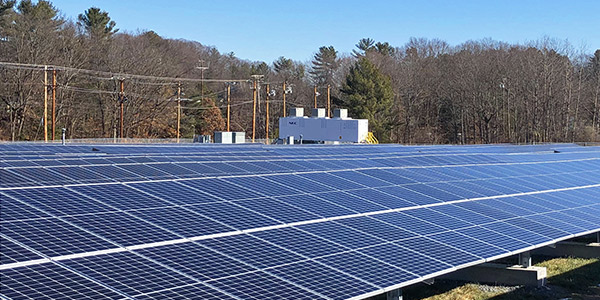A transmission line proposed by Eversource Energy in eastern Massachusetts has regulators seeking more information about whether solar-plus-storage would be an appropriate non-transmission alternative for the project.
Solar panels and battery storage are “no longer in the boutique range;” they are “becoming pretty substantial,” Andrew Greene, director of the Massachusetts Energy Facilities Siting Board, said during a public hearing Thursday.
Eversource, however, said in its proposal that solar-plus-storage was not a cost-effective or timely alternative under current market conditions.
The need for the project was identified through an ISO-NE-led study with Eversource of peak demand on the grid in Plymouth and Norfolk counties. The study found low-voltage conditions and thermal overloads in the Kingston, Mass., area that could affect service to 44,000 customers. The proposed 8-mile transmission line would connect the Carver, Plympton and Kingston substations to meet that reliability need, according to Eversource’s proposal.
Keith Jones, principal engineer at Eversource Energy, said during the hearing that adding a new renewable energy project in the area and pairing it with solar would also require transmission upgrades.
“We don’t yet know the full requirements of all the transmission upgrades, and we don’t know how these will be from a load forecasting standpoint,” Jones said.
The reliability issues in the area, he added, need to be addressed by 2022 to avoid a potential overload or overheating problem on the existing lines.
The load reduction achieved by a solar and battery storage system in the area would need to reach approximately 50 MW by 2022, Bob Andrew, director of systems solutions at Eversource, said.
Greene questioned whether a proliferation of energy storage under the state’s Solar Massachusetts Renewable Target (SMART) program and Clean Peak Energy Portfolio Standard could affect the need for the new transmission line.
SMART has been operating since 2018 to encourage development of community solar for low-income customers. Last year, the state energy department revised the program to make it easier and more appealing for private solar developers to serve low-income customers.
Massachusetts also adopted its new clean peak standard last August. The standard aims to ensure that peak load demands are increasingly met with clean energy resources instead of traditional fossil fuel resources.
Department of Public Utilities officials at the hearing directed Eversource to submit further information before it can continue with the transmission line review process. Among other things, DPU is seeking additional analysis on how much solar and storage would be necessary to meet the reliability needs in the Kingston area. It also is seeking details on what the impact to the project might be from the growth of the SMART program and clean peak standard.




